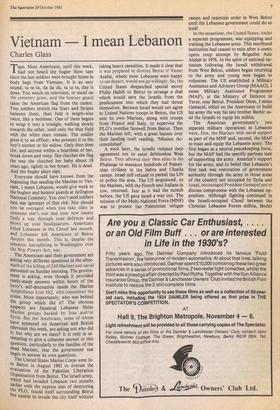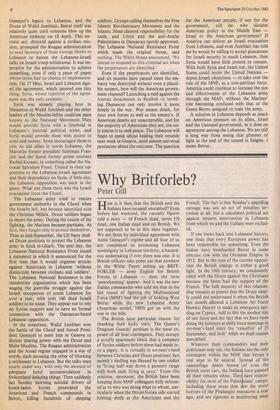Vietnam I mean Lebanon
Charles Glass
Taps. Most Americans, until this week, had not heard the bugler blow taps since the last soldiers were brought home in body bags from Vietnam. It is an eery sound, ta ta ta, da da da, ta ta ta, day is done. You watch on television, or stand on the cemetery grass, and the honour guard takes the American flag from the casket. Two soldiers stretch the Stars and Stripes between them, then fold it length-wise twice, like a bedsheet. One of them begins to wrap it into a triangle, walking slowly towards the other, until only the blue field with the white stars remain. The soldier gives it to an officer, who presents it to the boy's mother or his widow. Only then does she, and anyone within a heartbeat of her, break down and weep. She clutches the flag the way she clutched her baby about 18 years ago, tightly to her breast. He is dead. And the bugler plays taps.
Everyone should have known from the beginning that sending the Marines to Viet- nam, I mean Lebanon, would give work to the buglers and honour guards at Arlington National Cemetery. You don't send soldiers into war ignorant of that risk. Nor should You be outraged when you take sides in someone else's war and your new enemy finds a way through your defences and blows up your headquarters. Americans killed Lebanese in the Chouf last month, and Lebanese kill Americans at Beirut Airport this month. This is, despite the semantic hairsplitting in Washington over the War Powers Act, war.
The Americans and their government are asking very different questions in the after- math of the killing of 210 Marines and naval personnel on Sunday morning. The govern- ment is asking, even though it provided ready-made answers within hours of the lorry's self-detonation inside the Marine Amphibious Unit HQ, who committed the crime. More importantly: who was behind the group which did it? The obvious suspects are fanatical Lebanese Shiite Muslim groups backed by Iran and/or Syria. But the Americans, some of whom have appeared on American and British television this week, are asking not who did it, but why are we there? It is only in at- tempting to give a coherent answer to this question, particularly to the families of the dead Marines, that the government can begin to answer its own questions.
The United States Marine Corps went in- to Beirut in August 1982 to oversee the evacuation of the Palestine Liberation Organisation from Beirut. The Israeli army, Which had invaded Lebanon two months earlier with the express aim of destroying the PLO, found itself surrounding Beirut but unable to invade the city itself without
taking heavy casualties. It made it clear that it was prepared to destroy Beirut ii Yasser Arafat, whom most Lebanese were happy to see depart, would not go willingly. So, the United States despatched special envoy Philip Habib to Beirut to arrange a deal which would save the Israelis from the predicament into which they had thrust themselves. Because Israel would not agree to United Nations troops in Beirut, the US sent its own Marines, along with troops from France and Italy, to supervise the PLO's overdue farewell from Beirut. Then the Marines left, with a great banner over their landing craft reading, 'Mission Ac- complished'.
A week later, the Israelis violated their agreement not to enter defenceless West Beirut. They allowed their then allies in the Phalange to massacre hundreds of Palesti- nian civilians in the Sabra and Chatila camps. Israel still refused to permit the UN to police the area. The US acquiesced, so the Marines, with the French and Italians in tow, returned. Just as it had the month before, the US gave Israel a way out. The mission of the Multi-National Force (MNF) was to protect the Palestinian refugee camps and maintain order in West Beirut until the Lebanese government could do so itself.
In the meantime, the United States, under a separate programme, was equipping and training the Lebanese army. This moribund institution had ceased to exist after a comic opera coup attempt by Brigadier Aziz Ahdab in 1976. In the spirit of national op- timism following the Isreali withdrawal from West Beirut, soldiers began returning to the army and young men began to volunteer. The US established a Military Assistance and Advisory Group (MAAG), I mean Military Assistance Programme (MAP), at the Ministry of Defence in Yerze, near Beirut. President Diem, I mean Gemayel, relied on the Americans to build his army the way his late brother Bechir us- ed the Israelis to equip his militia.
The American government's two separate military operations in Lebanon were, first, the Marines with naval support as part of the MNF and, second, the MAP to train and equip the Lebanese army. The first began as a neutral peacekeeping force, but the MAP had the specific partisan task of supporting the army. America's support for the army, and its belief that Lebanon's first task was restoration of government authority through the army in those areas of the country not occupied by Syria and Israel, encouraged President Gemayel not to discuss compromise with the Lebanese op- position. Although fighting continued in the Israeli-occupied Chouf between the Christian Lebanese Forces militia, Bechir
Gemayel's legacy to Lebanon, and the Druze of Walid Jumblatt, Beirut itself was relatively quiet until someone blew up the American embassy on 18 April. This ter- rorist act, directed against a civilian mis- sion, prompted the Reagan administration to send Secretary of State George Shultz to Lebanon to hasten the Lebanese-Israeli talks on Israeli troop withdrawal. It was im- perative for the administration to achieve something, even if only a piece of paper whose terms had no chance of implementa- tion. On 17 May, Israel and Lebanon sign- ed the agreement, which ignored one tiny thing: Syria, whose rejection of the agree- ment was the only certainty.
Syria was already playing host in Damascus to Walid Jumblatt and the other leaders of the Muslim-leftist coalition once known as the National Movement. They. would provide Syria with a foothold in Lebanon's internal political scene, and Syria would provide them with access to arms and money. Syria encouraged them to join its old allies in north Lebanon, the Maronite former president Suleiman Fran- jieh and the Sunni former prime minister Rashid Karami, in something called the Na- tional Salvation Front. United in their op- position to the Lebanese-Israeli agreement and their dependence on Syria, if little else, the Lebanese opposition was back in the game. What put them there was the Israeli evacuation from the Chouf.
The Lebanese army tried to restore government authority in the Chouf when the Israelis left, but became identified with the Christian Militia. Druze soldiers began to desert the army. During the course of the fighting, the Marines became partisans. At first, they fought only to protect themselves. Then in mid-September, the US Navy shell- ed Druze positions to protect the Lebanese army in Souk el-Gharb. The next day, the Lebanese National Resistance Front issued a statement in which it announced for the first time that it would organise attacks against Americans in Lebanon 'without distinction between civilians and soldiers'. The Lebanese National Resistance is the clandestine organisation which has been waging the guerrilla struggle against the Israeli occupation of south Lebanon for over a year, with over 160 dead Israeli soldiers to its name. They appear not to rely on Syrian support and to have no formal connection with the Damascus-based Lebanese opposition.
In the meantime, Walid Jumblatt won the battle of the Chouf and forced Presi- dent Gemayel to meet him in Geneva to discuss sharing power with the Druze and Shiite Muslims. The Reagan administration and the Assad regime engaged in a war of words, each accusing the other of blocking a settlement in Lebanon. But the talks were nearly under way, with only the absence of adequate hotel accommodation in Switzerland delaying things. Then suddenly last Sunday morning suicidal drivers of bomb-laden lorries penetrated the American and French compounds in Beirut, killing hundreds of sleeping soldiers. Groups calling themselves the Free Islamic Revolutionary Movement and the Islamic Jihad claimed responsibility for the raids, and Libya and the anti-Arafat Palestinians in Damascus openly approved. The Lebanese National Resistance Front which made the original threat, said nothing. The White House announced, 'We intend to respond to this criminal act when the perpetrators are identified.'
Even if the perpetrators are identified, and six months have passed since the em- bassy was destroyed without even a plausi- ble suspect, how will the American govern- ment respond? Launching a raid against the Iranian detachment in Baalbek or bomb- ing Damascus can only involve it more deeply in the war. War means death, for your own forces as well as the enemy's. If American deaths are unacceptable, and for the majority of Americans they are, the on- ly course is to seek peace. The Lebanese will begin to speak about healing their wounds next week in Geneva, amid almost universal pessimism about the outcome. The question for the American people, if not for the government, will be: who dictates American policy in the Middle East — Israel or the American government? If America can deliver an Israeli evacuation from Lebanon, and even Jumblatt has told me he would be willing to accept guarantees for Israeli security in south Lebanon, then Syria would have little pretext to remain. With both Syria and Israel out, the United States could invite the United Nations — depite Israeli objections — to take over the role of the MNF, as a non-partisan force. America could continue to increase the size and effectiveness of the Lebanese army through the MAP, without the Marines' role becoming confused with that of the Green Berets assigned to train the army.
A solution in Lebanon depends as much on American pressure on its allies, Israel and the Gemayel government, as it does on agreement among the Lebanese. We are still a long way from seeing that glimmer of light at the end of the tunnel in Saigon. I mean Beirut.















































 Previous page
Previous page